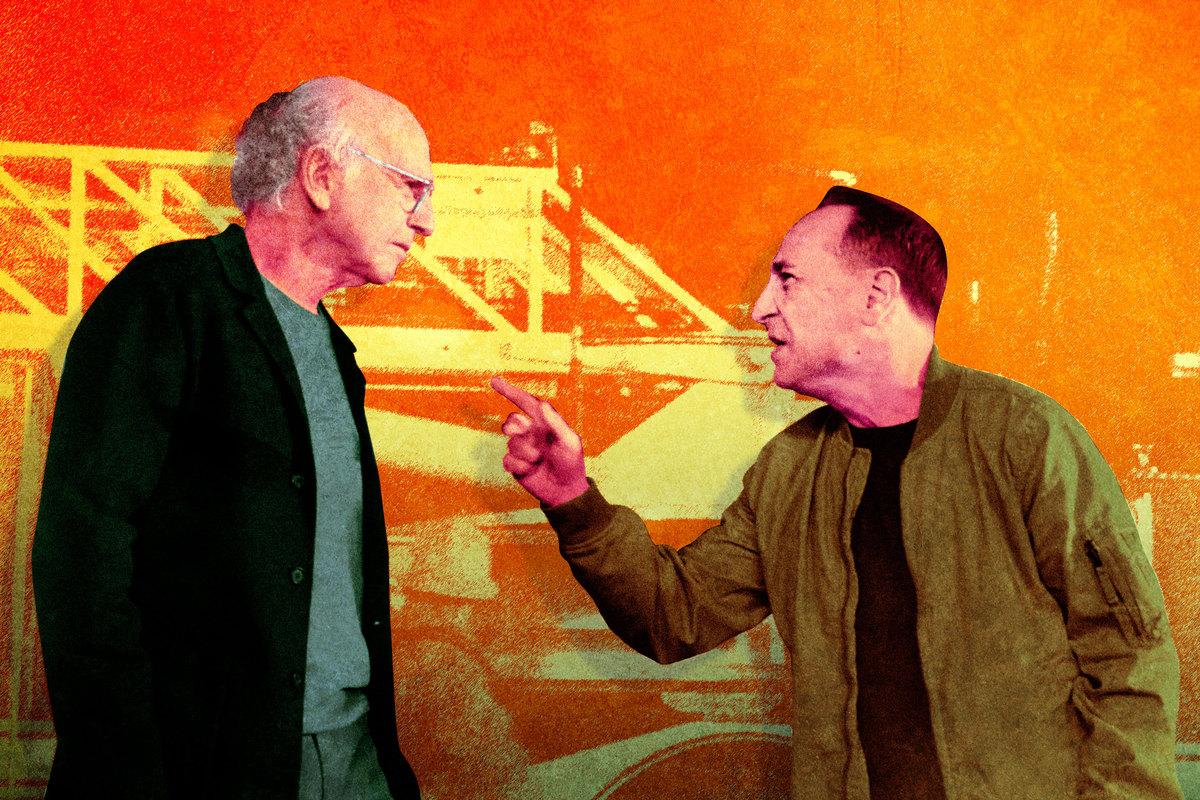

As a pandemic upends our social order and we wonder whether life as we’ve known it will last, my mind keeps returning to a less pressing question: What would Larry David do?
In some ways, the days of social distancing seem like TV Larry’s time to shine. Earlier this month, a friend of mine who felt sick got tested for COVID-19, and his employer put him on mandatory sick leave while he awaited the results. “I can’t say I’m too upset to be forced not to go to work,” he told me via text. (His results came back negative; it was nothing time and Imodium couldn’t cure.) That sounded like the makings of a Curb Your Enthusiasm episode: Larry feels fine but gets tested anyway so he can use the uncertainty as an excuse to stay home. Larry loves a cancellation, and nothing causes more cancellations than a pandemic that prohibits physical contact. It’s not as if TV Larry would be consumed by compassion for the infected. On the other hand, he’d miss sports.
Shortly after my friend’s test, the pandemic picked up steam and the world changed. Being ordered not to go to work wasn’t so special: Almost everyone who wasn’t laid off was working from home. And after a few days of self-isolation, solitude didn’t seem so desirable. Larry might mine some material from the fear of contagion, the etiquette of remote gatherings via video, the dos and don’ts of face masks, the stringent rules for senior citizens, or the Covidiots who hoard supplies or keep partying while others dutifully flatten the curve. But so much of Curb’s comedy comes from social proximity, which generates the friction between TV Larry and the rule breakers or abiders who clash with his views. COVID-19 has the same effect as the MAGA hat Larry wears in Season 10 when he wants to protect his privacy: No one wants to go near anyone else.
But if Larry got his wish, would he be happy? In a time of total separation, would he still have something to say? And by the time more Curb could come out, would we be ready to look back and laugh at these dark days, or would we want this strange, unsettling episode to stay in the past?
On Curb’s Season 10 finale (and 100th all-time episode), “The Spite Store,” Larry runs afoul of pre-pandemic society. He can’t count on the novel coronavirus to shut down Mocha Joe’s, so he continues to wage war via spite store. In the end, he succeeds in destroying the business that banned him—but the monkey’s paw finger curls, and his spite comes back to bite him too.
Like the instant-classic Season 10 premiere, “Happy New Year,” “The Spite Store” is packed with plot, some of it self-contained and some of it tied to season-long arcs. The finale features recurring bits about siren abusers, the “big Johnson community,” parents’ preferred color for biracial babies, avoiding wasted water to respect the drought, and vindictive doctors who sulk when patients seek second opinions, as well as Larry’s stray observations about robes (“You can’t just fling one side over the other”), tip jars (“We might as well be beggars”), and daybeds (“It’s like half chair, half couch—it’s like a furniture centaur”). But all of those standalone strands intertwine to bring about Larry’s comeuppance.
Alice returns to Latte Larry’s, and a taste of dry scone brings back her memory of the lawsuit she was planning to file. After a meet-cute with Mocha Joe, she joins forces with Larry’s next-door nemesis and Frank, an annoying real-estate agent from Larry’s country club (played by Paul Scheer). Then the spite store and its target burn down because Joey Funkhauser’s new, giant Johnson knocks one of Larry’s self-heating coffee cups (which existed long before Larry’s idea) onto a pile of paper and Larry refuses to pull over for a fire truck, believing its passengers to be siren abusers. Latte Larry’s and Mocha Joe’s are no more, but from their ashes arises a new thorn in Larry’s side: the spite house. Using the insurance payout from the fire and the settlement from the lawsuit, Mocha Joe and Alice move in next door and start hosting loud parties to annoy their new neighbor.
Curb’s comedy works in part because TV Larry isn’t always in the right: The show highlights his own flaws as often as it exposes those of others. Larry’s failings are a theme of the finale, beginning with the cold open (a rarity for Curb). On the fake spite-store segment from Today, Larry tells a TV interviewer that he doesn’t care for his pocket square. “You don’t think that’s kind of insulting?” the reporter asks. “No, not in the least,” Larry says. “If you told me you didn’t like my jacket or something, I wouldn’t care.” But when the reporter informs him that he doesn’t like his jacket, Larry’s skin proves thinner than he thought. “Oh, is that so,” he sniffs.
As the segment reveals, Larry’s spite store inspires other celebrities to open their own versions. Although the imitation flatters him, it also prevents him from repairing Will’s watch, because Mila Kunis drives his go-to repair person out of business. And while Larry is right to “foresee big problems” with Joey’s penis, it’s not just the giant phallus that fucks Latte Larry’s. It’s also Larry’s refusal to heed the fire truck’s siren, and the flame-fanning innovations he introduced: the mugs, the bolted-down tables, omnipresent hand sanitizer, and defecation-free bathrooms. “If I was trying to tell someone how to burn a place down, I would suggest every step you took in your business,” the fire chief informs him, adding, “You did so many stupid things, it looks like arson.” Some of the rules Larry rebels against are rules for a reason. And some of his flights of fancy end up doing harm: As Jeff says when Larry wonders whether he could induce labor by scaring a pregnant mother, “You gotta really think these hypotheticals out, ’cause they always end poorly.” Or as Susie succinctly puts it, “What the fuck is the matter with you?”
“The Spite Store” doesn’t have the highs of “Happy New Year,” and it’s not as well-plotted as the premiere. I’ll welcome any excuse for more Sam Richardson in my life, but Tara and Will kind of came out of nowhere, as did Scheer’s “shanda for the bald.” It’s also a tad disappointing that Cheryl and Ted don’t appear, given that Larry’s attempts to win back his ex-wife, and Ted’s efforts to undermine him, were two of this season’s central story lines. And although Larry came close to doing his signature staredown for the first time this season when he questioned Joey about the broken watch, Joey caved before the look could linger.
Like the season as a whole, “The Spite Store” was heavy on celebrity sightings, including cameos by Savannah Guthrie and Hoda Kotb, Jonah Hill, Sean Penn, and Mila Kunis. Like Clive Owen and Jon Hamm before them, this week’s stars acquitted themselves well—especially Hill as a scrupulous deli owner, who delivered one of the episode’s most memorable lines: “Any time I see a customer walk in here that used to go to Irv’s, it’s like my own tiny human Oscar walking in here.”
The celebrity guest star who seemed most out of place this season was one who wasn’t playing himself: Vince Vaughn as Freddy Funkhouser, Marty’s half-brother. Freddy never fully fit into Larry’s friend group, and his presence only drew attention to the void left by the late Bob Einstein. Freddy, Joey, and even Freddy’s uncle Moke all played prominent roles this season, but Curb chose to honor Einstein by keeping Marty alive off-screen. On Curb, what is dead may never die. “No, we don’t talk about his character dying on the show,” Jeff Garlin said last November. “Why do we need that on a comedy show? That doesn’t fit on our show. There is no melancholy on Curb Your Enthusiasm.”
Nor is TV Larry likely to endure any lasting consequences of his actions. This season revolved around the reality that thanks to that sweet, sweet Seinfeld syndication deal, he has the fuck you money to start a store just to spite someone who served him cold coffee. He’s also able to buy his way out of every jam. When someone sues him, he settles. When a car salesman suspects him of visiting the dealership for licorice alone, he buys a new car to prove him wrong. When he wrecks that car, he orders another. When Latte Larry’s burns down, he shrugs off the loss. And now that his enemies live too close for comfort, he’ll probably buy a new house. I might resent TV Larry if I didn’t love him so much.
Like all Curb season finales, “The Spite Store” could end up being a series finale. As always, Curb’s future is up in the air and dependent on David’s level of inspiration. Although the last episode resolves the season satisfactorily, it feels less final than most of the season-enders from the second half of the series. David has said that whenever Curb comes to a close, it will end without fanfare, but there have been tentative indications that more Curb could be in the works. “We’re definitely talking about talking about it,” said executive producer Jeff Schaffer in January, adding, “We definitely have ideas that didn’t fit into the season.”
That seems somewhat encouraging, considering Schaffer said after Season 9 that David ends each season drained of ideas and convinced that he’ll never have another. A shortage of ideas didn’t seem to be Season 10’s problem; if anything, the season sometimes suffered from trying to cram in too many plot points. But a solid season of Curb still emerged from the mishmash. As the sage saying goes, “You gotta break a couple watches to know how to handle a big cock.”
Disclosure: HBO is an initial investor in The Ringer.

